Unit 8Have you read Treasure Island yet Section A Grammar Focus-4c课件(共31张PPT) 人教版英语八年级下册
文档属性
| 名称 | Unit 8Have you read Treasure Island yet Section A Grammar Focus-4c课件(共31张PPT) 人教版英语八年级下册 |
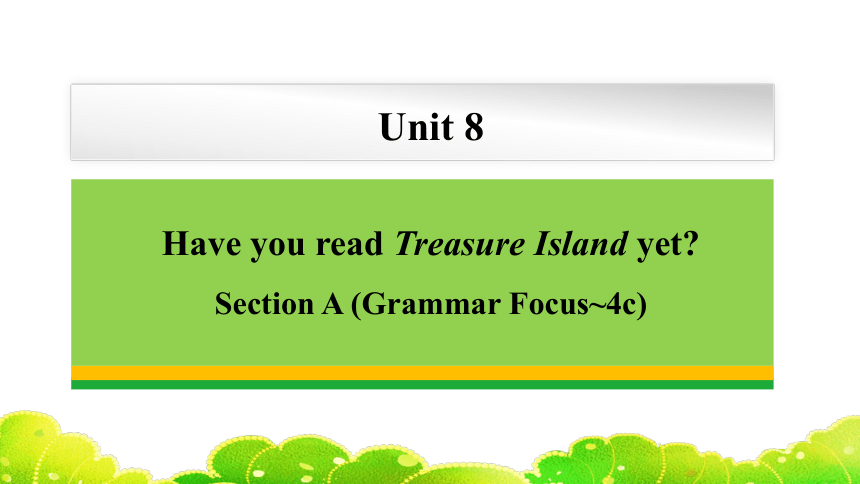
|
|
| 格式 | pptx | ||
| 文件大小 | 3.4MB | ||
| 资源类型 | 教案 | ||
| 版本资源 | 人教新目标(Go for it)版 | ||
| 科目 | 英语 | ||
| 更新时间 | 2024-01-01 00:00:00 | ||
图片预览

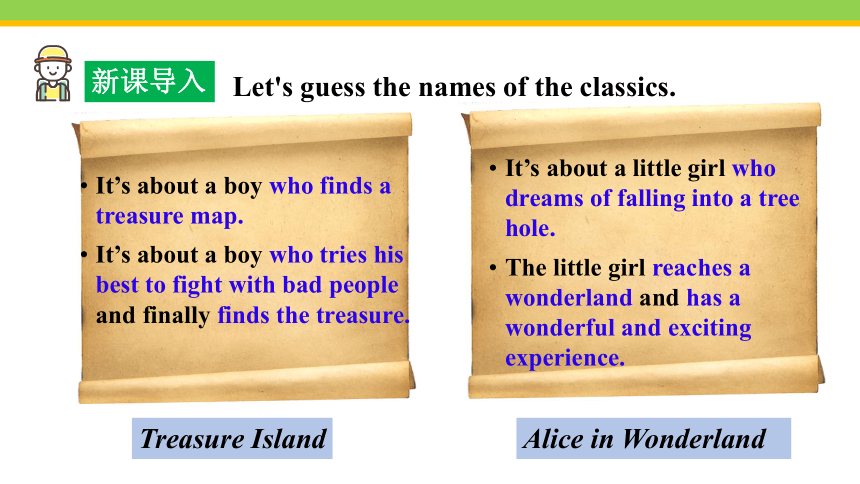
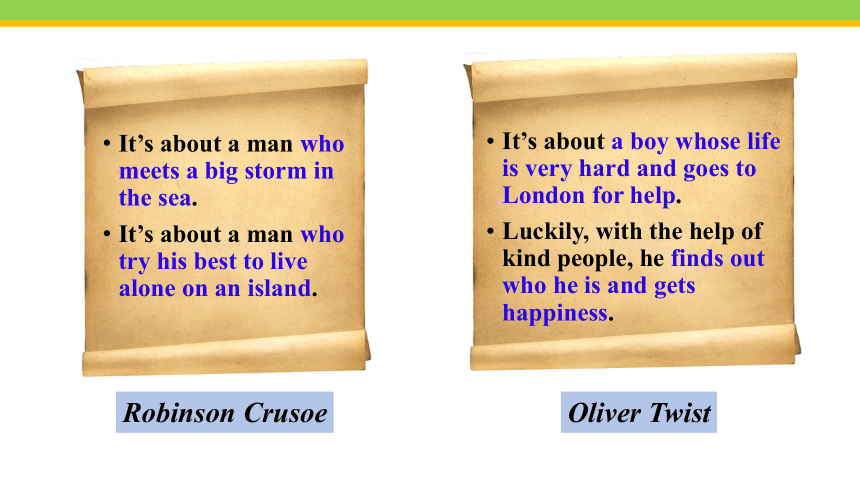
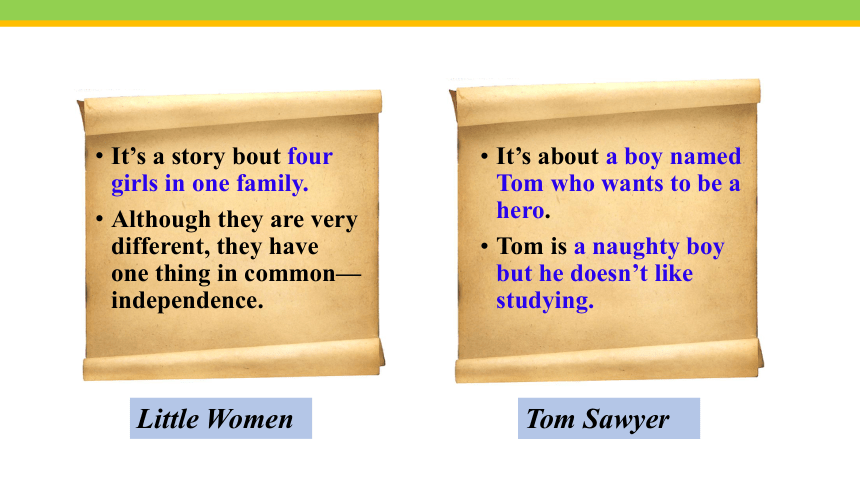
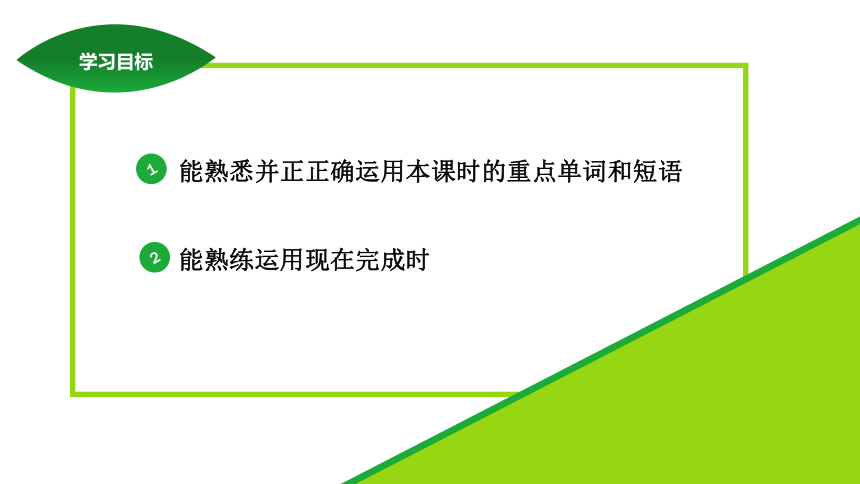
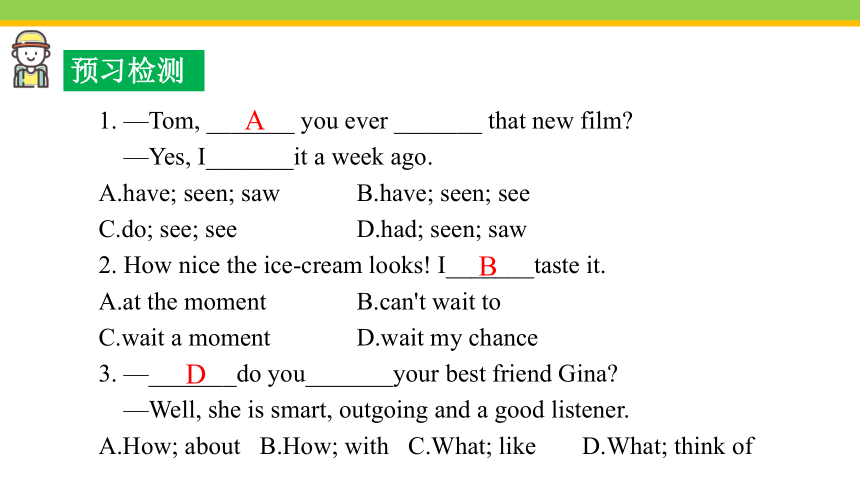

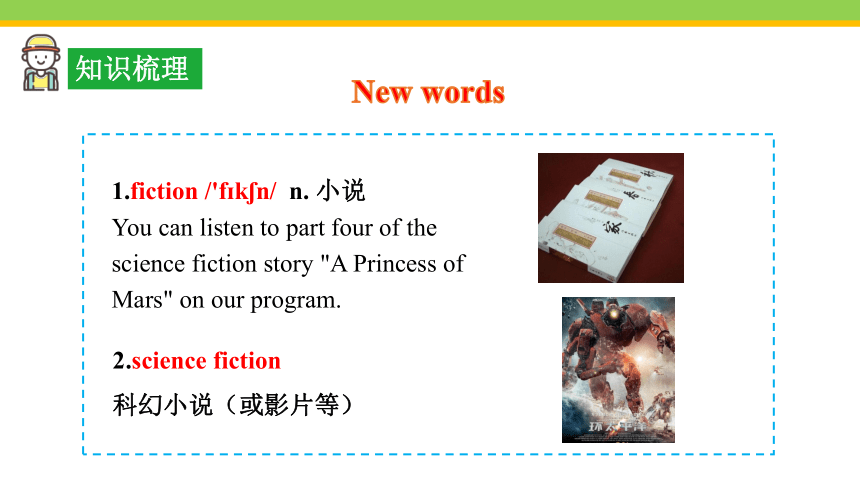
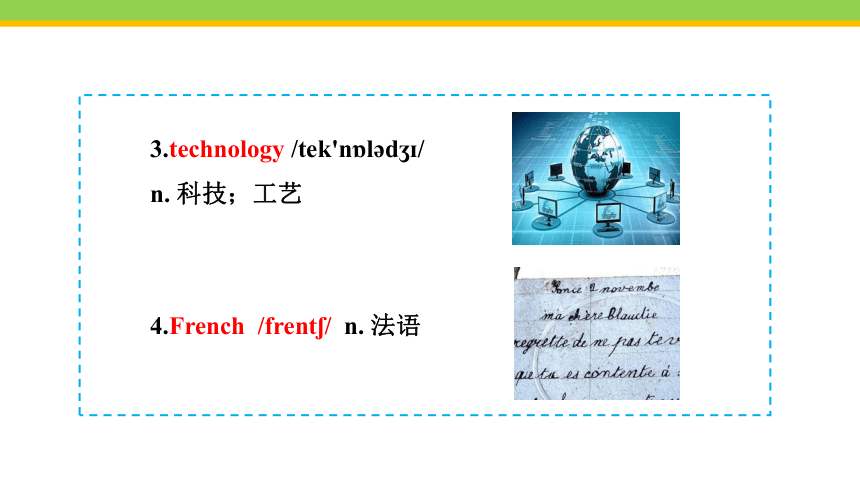
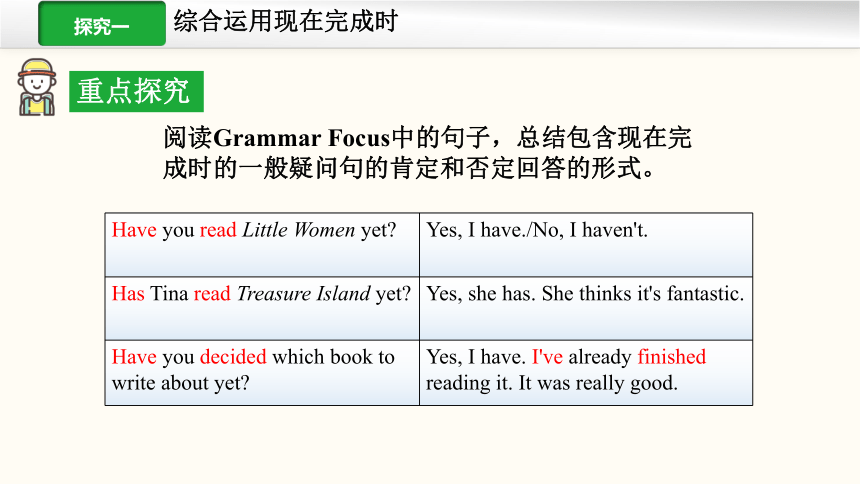
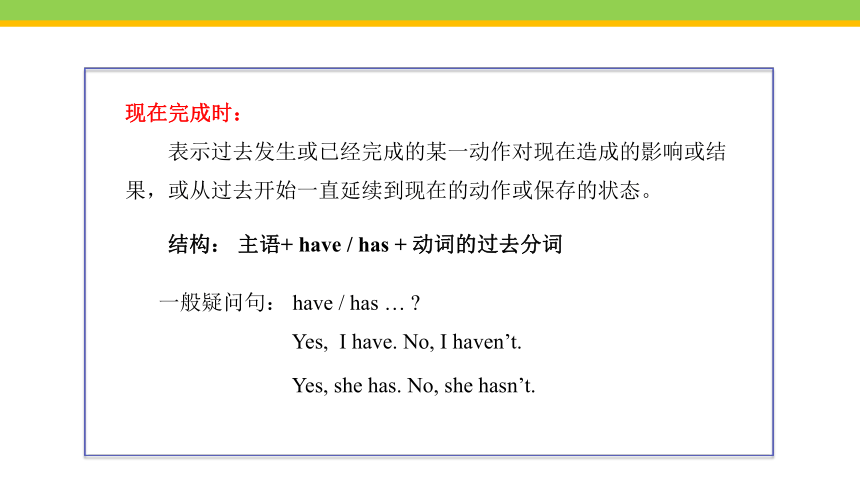
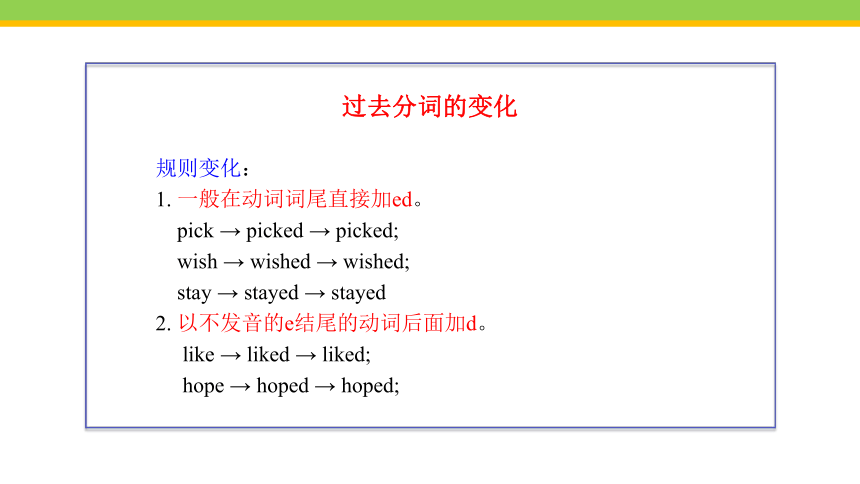
文档简介
(共31张PPT)
Unit 8
Have you read Treasure Island yet
Section A (Grammar Focus~4c)
新课导入
Let's guess the names of the classics.
Treasure Island
It’s about a little girl who dreams of falling into a tree hole.
The little girl reaches a wonderland and has a wonderful and exciting experience.
Alice in Wonderland
It’s about a boy who finds a treasure map.
It’s about a boy who tries his best to fight with bad people and finally finds the treasure.
It’s about a man who meets a big storm in the sea.
It’s about a man who try his best to live alone on an island.
It’s about a boy whose life is very hard and goes to London for help.
Luckily, with the help of kind people, he finds out who he is and gets happiness.
Robinson Crusoe
Oliver Twist
It’s a story bout four girls in one family.
Although they are very different, they have one thing in common—independence.
It’s about a boy named Tom who wants to be a hero.
Tom is a naughty boy but he doesn’t like studying.
Little Women
Tom Sawyer
2
1
能熟悉并正正确运用本课时的重点单词和短语
能熟练运用现在完成时
预习检测
1. —Tom, _______ you ever _______ that new film
—Yes, I_______it a week ago.
A.have; seen; saw B.have; seen; see
C.do; see; see D.had; seen; saw
2. How nice the ice-cream looks! I_______taste it.
A.at the moment B.can't wait to
C.wait a moment D.wait my chance
3. —_______do you_______your best friend Gina
—Well, she is smart, outgoing and a good listener.
A.How; about B.How; with C.What; like D.What; think of
A
B
D
4. —What were you doing at that time yesterday
—I was thinking about_______a song.
A.recording B.recorded
C.to record D.record
5. —Tom, would you like to train our football team
— _______ .
A.Sure, I'd like to B.You're welcome
C.Thank you very much D.Not at all
A
A
知识梳理
New words
1.fiction /'f k n/ n. 小说
You can listen to part four of the science fiction story "A Princess of Mars" on our program.
2.science fiction
科幻小说(或影片等)
3.technology /tek'n l d / n. 科技;工艺
4.French /frent / n. 法语
重点探究
综合运用现在完成时
阅读Grammar Focus中的句子,总结包含现在完成时的一般疑问句的肯定和否定回答的形式。
Have you read Little Women yet Yes, I have./No, I haven't.
Has Tina read Treasure Island yet Yes, she has. She thinks it's fantastic.
Have you decided which book to write about yet Yes, I have. I've already finished reading it. It was really good.
现在完成时:
表示过去发生或已经完成的某一动作对现在造成的影响或结果,或从过去开始一直延续到现在的动作或保存的状态。
结构: 主语+ have / has + 动词的过去分词
一般疑问句: have / has …
Yes, I have. No, I haven’t.
Yes, she has. No, she hasn’t.
过去分词的变化
规则变化:
1. 一般在动词词尾直接加ed。
pick → picked → picked;
wish → wished → wished;
stay → stayed → stayed
2. 以不发音的e结尾的动词后面加d。
like → liked → liked;
hope → hoped → hoped;
3. 以“辅音字母 + y”结尾的动词,变y为i,再加-ed。
study → studied → studied;
hurry → hurried → hurried;
reply → replied → replied
4. 词尾只有一个辅音字母的重读闭音节动词,要双写辅音字母,再加-ed。
stop → stopped → stopped
clap → clapped → clapped 拍手
不规则变化:
5. 以不变应万变。AAA 格式
let → let → let
put → put → put
read → read → read
6. ABB 格式
feel → felt → felt
keep → kept → kept
sleep → slept → slept
7. ABA 格式
come → came → come
become → became → become
8. ABC 格式
bear → bore → born
break → broke → broken
grow → grew → grown
9.AAB 格式
beat → beat → beaten
现在完成时与一般过去时的区别
现在完成时:表示过去发生或已经完成的某一动作对现在造成的影响或结果,或从过去开始一直延续到现在的动作或保存的状态,强调的是现在的情况,不能和表示过去的时间状语连用(如:in 1990,last Sunday 等)。
一般过去时:一般过去时只表示过去的动作或状态,和现在不发生关系(即动作或状态在现在已经结束),它可以和表示过去的时间状语连用。
I saw this film yesterday. (强调看的动作发生过了)
I have seen this film. (强调对现在的影响,电影的内容已经知道了)
Have you read Little Women yet Yes, I have./No, I haven't.
Has Tina read Treasure Island yet Yes, she has. She thinks it's fantastic.
Have you decided which book to write about yet Yes, I have. I've already finished reading it. It was really good.
观察Grammar Focus中的句子,小组讨论yet与already的用法区别。
Group work
用于现在完成时的否定和疑问句中
yet
already
Mother hasn’t come home yet. 妈妈还没回来。
用于现在完成时的肯定句中
Jim has already finished his work.
Jim已经把他的工作做完了。
4a. Use the words in brackets to complete the conversations.
1. A: Would you like something to drink
B: No, thanks. ______________________. (just / drink some tea)
2. A: I heard you lost your key.
___________________________________ (find)
B: No, not yet.
3. A: Do you know when Tom is leaving
B: ______________________. (already / leave)
A: When _____________________ (leave)
B: This morning.
I’ve just drunk some tea
Have you found it yet
Tom/He has already left
did he leave
4. A: Is your sister going to the movies with us tonight
B: No. _____________________________. (already/see the film)
5. A: What do your parents think about our plan
B: I ____________________________. (not / tell them / yet)
She has already seen the film
have not/haven’t told them yet
活动小结
当堂检测见DCF课件
通过以上活动,我们学习了现在完成时的结构为1.____________,现在完成时的疑问句,其肯定回答是2._______________,否定回答是3.__________________。Yet用于4.__________________中,already用于5.___________中。
have/has done
Yes,sb have/has
No,sb haven’t/hasn’t
否定句和疑问句
肯定句
正确表达看法
Sally _________ (love) reading. In the morning, she reads the newspaper and in the evening she reads books. She ________ already _________ (read) more than 100 different books! Her favorite kind of books is science fiction. She is interested in science and technology and loves to imagine what the world _______ (be) like in 50 years. She _______ (finish) reading a book about robots last week and _________ (write) a book report about it next week for her French class. Every time she is in the library, Sally looks at the many books she _____________ (not read) yet and she can’t wait to read them!
loves
has
read
will be
finished
will write
has not read
用括号内单词的适当形式填空,并在文章中找出一般现在时、一般过去时、一般将来时、现在完成时。
Complete the chart with information about you and a friend.
You Your friend Comments
Books I have already read
Movies I have already seen
Songs I have already heard
Pair work
Make conversations with information in the chart.
What movies have you already seen
I’ve already seen...
What do you think of them
I think...
小组展示
1 组
2 组
3 组
4 组
What do you think of them
What do you think of ... = How do you like ...
表示“你认为……怎么样 ”,用来询问对方对某人或某事的看法和观点。
例如:
—What do you think of the film = How do you like the film
—It’s great.很棒。
易错辨析:think about, think of与think over
think about 考虑,思考 后接名词、代词、动词-ing形式 —What do you think about your Chinese teacher
—I like her very much.
think of 思考,考虑,对……有某种看法 可以与think about 互换 What do you think of the movie =What do you think about the movie
想出,想着,想起 不可用think about 代替 I always think of my childhood.
think over 仔细考虑,认真考虑 其中over是副词,宾语若是名词,则可位于over之前或之后;当宾语是代词时,则必须放在over之前 Think it over before you do it.
It’s very important for you.You must think it over.
活动小结
当堂检测见DCF课件
通过以上活动,我们知道要询问他人“你认为...怎么样?”1._____________________,同义句为2.__________________。
What do you think of...
How do you like...
一、根据汉语完成句子。
当堂检测
1.你已经告诉你父母这条新闻了吗?
______ you ______ your parents the news
2.你知道他什么时候离开吗?
Do you know ______ he ______
3.他昨天晚上读完了这本书。
He ________ ________the book last night.
4.我已经读完了10本书了。
I ______ ______ ______ ten books.
5.我已经在这儿呆了15年了。
I _______ _______ _______ here for 15 years.
Have told
when left
finished reading
have already read
have already stayed
二、按要求改写句子。
1. They have lived there for 3 years.(对划线部分提问)
______ ______ ______ they ______ there
2. Both of my sisters have already come. (改为否定句)
________ of my sisters ______ come ______.
3. He has already learned about it. (改为否定句)
He ______ learned about it ______.
4. Have they walked back to the park。(作肯定和否定回答)
______, ______ ______ ./______ ,______ ______.
How long have lived
Neither has yet
hasn’t yet
Yes they have No they haven’t
课堂总结
Unit 8
Section A (Grammar Focus~4c)
现在完成时的综合运用:通过以上活动,我们学习了现在完成时的结构为1.____________,现在完成时的疑问句,其肯定回答是2.______________,否定回答是3.__________________。Yet用于4._______________中,already用于5._________中。
have/has done
Yes,sb have/has
No,sb haven’t/hasn’t
肯定句
否定句和疑问句
重点词汇及短语:
__________________________________
__________________________________
__________________________________
__________________________________
fiction
a bit
something to drink
science fiction
think about
technology
French
can't wait to do sth.
be interested in
more than
next week
Unit 8
Have you read Treasure Island yet
Section A (Grammar Focus~4c)
新课导入
Let's guess the names of the classics.
Treasure Island
It’s about a little girl who dreams of falling into a tree hole.
The little girl reaches a wonderland and has a wonderful and exciting experience.
Alice in Wonderland
It’s about a boy who finds a treasure map.
It’s about a boy who tries his best to fight with bad people and finally finds the treasure.
It’s about a man who meets a big storm in the sea.
It’s about a man who try his best to live alone on an island.
It’s about a boy whose life is very hard and goes to London for help.
Luckily, with the help of kind people, he finds out who he is and gets happiness.
Robinson Crusoe
Oliver Twist
It’s a story bout four girls in one family.
Although they are very different, they have one thing in common—independence.
It’s about a boy named Tom who wants to be a hero.
Tom is a naughty boy but he doesn’t like studying.
Little Women
Tom Sawyer
2
1
能熟悉并正正确运用本课时的重点单词和短语
能熟练运用现在完成时
预习检测
1. —Tom, _______ you ever _______ that new film
—Yes, I_______it a week ago.
A.have; seen; saw B.have; seen; see
C.do; see; see D.had; seen; saw
2. How nice the ice-cream looks! I_______taste it.
A.at the moment B.can't wait to
C.wait a moment D.wait my chance
3. —_______do you_______your best friend Gina
—Well, she is smart, outgoing and a good listener.
A.How; about B.How; with C.What; like D.What; think of
A
B
D
4. —What were you doing at that time yesterday
—I was thinking about_______a song.
A.recording B.recorded
C.to record D.record
5. —Tom, would you like to train our football team
— _______ .
A.Sure, I'd like to B.You're welcome
C.Thank you very much D.Not at all
A
A
知识梳理
New words
1.fiction /'f k n/ n. 小说
You can listen to part four of the science fiction story "A Princess of Mars" on our program.
2.science fiction
科幻小说(或影片等)
3.technology /tek'n l d / n. 科技;工艺
4.French /frent / n. 法语
重点探究
综合运用现在完成时
阅读Grammar Focus中的句子,总结包含现在完成时的一般疑问句的肯定和否定回答的形式。
Have you read Little Women yet Yes, I have./No, I haven't.
Has Tina read Treasure Island yet Yes, she has. She thinks it's fantastic.
Have you decided which book to write about yet Yes, I have. I've already finished reading it. It was really good.
现在完成时:
表示过去发生或已经完成的某一动作对现在造成的影响或结果,或从过去开始一直延续到现在的动作或保存的状态。
结构: 主语+ have / has + 动词的过去分词
一般疑问句: have / has …
Yes, I have. No, I haven’t.
Yes, she has. No, she hasn’t.
过去分词的变化
规则变化:
1. 一般在动词词尾直接加ed。
pick → picked → picked;
wish → wished → wished;
stay → stayed → stayed
2. 以不发音的e结尾的动词后面加d。
like → liked → liked;
hope → hoped → hoped;
3. 以“辅音字母 + y”结尾的动词,变y为i,再加-ed。
study → studied → studied;
hurry → hurried → hurried;
reply → replied → replied
4. 词尾只有一个辅音字母的重读闭音节动词,要双写辅音字母,再加-ed。
stop → stopped → stopped
clap → clapped → clapped 拍手
不规则变化:
5. 以不变应万变。AAA 格式
let → let → let
put → put → put
read → read → read
6. ABB 格式
feel → felt → felt
keep → kept → kept
sleep → slept → slept
7. ABA 格式
come → came → come
become → became → become
8. ABC 格式
bear → bore → born
break → broke → broken
grow → grew → grown
9.AAB 格式
beat → beat → beaten
现在完成时与一般过去时的区别
现在完成时:表示过去发生或已经完成的某一动作对现在造成的影响或结果,或从过去开始一直延续到现在的动作或保存的状态,强调的是现在的情况,不能和表示过去的时间状语连用(如:in 1990,last Sunday 等)。
一般过去时:一般过去时只表示过去的动作或状态,和现在不发生关系(即动作或状态在现在已经结束),它可以和表示过去的时间状语连用。
I saw this film yesterday. (强调看的动作发生过了)
I have seen this film. (强调对现在的影响,电影的内容已经知道了)
Have you read Little Women yet Yes, I have./No, I haven't.
Has Tina read Treasure Island yet Yes, she has. She thinks it's fantastic.
Have you decided which book to write about yet Yes, I have. I've already finished reading it. It was really good.
观察Grammar Focus中的句子,小组讨论yet与already的用法区别。
Group work
用于现在完成时的否定和疑问句中
yet
already
Mother hasn’t come home yet. 妈妈还没回来。
用于现在完成时的肯定句中
Jim has already finished his work.
Jim已经把他的工作做完了。
4a. Use the words in brackets to complete the conversations.
1. A: Would you like something to drink
B: No, thanks. ______________________. (just / drink some tea)
2. A: I heard you lost your key.
___________________________________ (find)
B: No, not yet.
3. A: Do you know when Tom is leaving
B: ______________________. (already / leave)
A: When _____________________ (leave)
B: This morning.
I’ve just drunk some tea
Have you found it yet
Tom/He has already left
did he leave
4. A: Is your sister going to the movies with us tonight
B: No. _____________________________. (already/see the film)
5. A: What do your parents think about our plan
B: I ____________________________. (not / tell them / yet)
She has already seen the film
have not/haven’t told them yet
活动小结
当堂检测见DCF课件
通过以上活动,我们学习了现在完成时的结构为1.____________,现在完成时的疑问句,其肯定回答是2._______________,否定回答是3.__________________。Yet用于4.__________________中,already用于5.___________中。
have/has done
Yes,sb have/has
No,sb haven’t/hasn’t
否定句和疑问句
肯定句
正确表达看法
Sally _________ (love) reading. In the morning, she reads the newspaper and in the evening she reads books. She ________ already _________ (read) more than 100 different books! Her favorite kind of books is science fiction. She is interested in science and technology and loves to imagine what the world _______ (be) like in 50 years. She _______ (finish) reading a book about robots last week and _________ (write) a book report about it next week for her French class. Every time she is in the library, Sally looks at the many books she _____________ (not read) yet and she can’t wait to read them!
loves
has
read
will be
finished
will write
has not read
用括号内单词的适当形式填空,并在文章中找出一般现在时、一般过去时、一般将来时、现在完成时。
Complete the chart with information about you and a friend.
You Your friend Comments
Books I have already read
Movies I have already seen
Songs I have already heard
Pair work
Make conversations with information in the chart.
What movies have you already seen
I’ve already seen...
What do you think of them
I think...
小组展示
1 组
2 组
3 组
4 组
What do you think of them
What do you think of ... = How do you like ...
表示“你认为……怎么样 ”,用来询问对方对某人或某事的看法和观点。
例如:
—What do you think of the film = How do you like the film
—It’s great.很棒。
易错辨析:think about, think of与think over
think about 考虑,思考 后接名词、代词、动词-ing形式 —What do you think about your Chinese teacher
—I like her very much.
think of 思考,考虑,对……有某种看法 可以与think about 互换 What do you think of the movie =What do you think about the movie
想出,想着,想起 不可用think about 代替 I always think of my childhood.
think over 仔细考虑,认真考虑 其中over是副词,宾语若是名词,则可位于over之前或之后;当宾语是代词时,则必须放在over之前 Think it over before you do it.
It’s very important for you.You must think it over.
活动小结
当堂检测见DCF课件
通过以上活动,我们知道要询问他人“你认为...怎么样?”1._____________________,同义句为2.__________________。
What do you think of...
How do you like...
一、根据汉语完成句子。
当堂检测
1.你已经告诉你父母这条新闻了吗?
______ you ______ your parents the news
2.你知道他什么时候离开吗?
Do you know ______ he ______
3.他昨天晚上读完了这本书。
He ________ ________the book last night.
4.我已经读完了10本书了。
I ______ ______ ______ ten books.
5.我已经在这儿呆了15年了。
I _______ _______ _______ here for 15 years.
Have told
when left
finished reading
have already read
have already stayed
二、按要求改写句子。
1. They have lived there for 3 years.(对划线部分提问)
______ ______ ______ they ______ there
2. Both of my sisters have already come. (改为否定句)
________ of my sisters ______ come ______.
3. He has already learned about it. (改为否定句)
He ______ learned about it ______.
4. Have they walked back to the park。(作肯定和否定回答)
______, ______ ______ ./______ ,______ ______.
How long have lived
Neither has yet
hasn’t yet
Yes they have No they haven’t
课堂总结
Unit 8
Section A (Grammar Focus~4c)
现在完成时的综合运用:通过以上活动,我们学习了现在完成时的结构为1.____________,现在完成时的疑问句,其肯定回答是2.______________,否定回答是3.__________________。Yet用于4._______________中,already用于5._________中。
have/has done
Yes,sb have/has
No,sb haven’t/hasn’t
肯定句
否定句和疑问句
重点词汇及短语:
__________________________________
__________________________________
__________________________________
__________________________________
fiction
a bit
something to drink
science fiction
think about
technology
French
can't wait to do sth.
be interested in
more than
next week
同课章节目录
- Unit 1 What's the matter?
- Section A
- Section B
- Unit 2 I'll help to clean up the city parks.
- Section A
- Section B
- Unit 3 Could you please clean your room?
- Section A
- Section B
- Unit 4 Why don't you talk to your parents?
- Section A
- Section B
- Unit 5 What were you doing when the rainstorm came
- Section A
- Section B
- Review of Units 1-5
- Unit 6 An old man tried to move the mountains.
- Section A
- Section B
- Unit 7 What's the highest mountain in the world?
- Section A
- Section B
- Unit 8 Have you read Treasure Island yet?
- Section A
- Section B
- Unit 9 Have you ever been to a museum?
- Section A
- Section B
- Unit 10 I've had this bike for three years.
- Section A
- Section B
